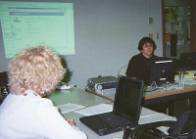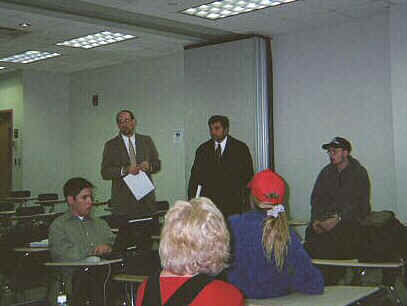

PRINCIPLES OF
SECOND LANGUAGE LEARNING
Spring 2003


LNGN 325-01
This course will examine theories of second language acquisition; error analysis; individual learner differences; culture and language learning styles; and the roles of input, interaction, and formal instruction in language acquisition. Students will also explore the impact of the newest technologies on teaching and learning practices. Please set up your MSU e-mail account.
Location and Time:
T 0400PM 0515PM DI 275
F 0400PM 0515PM DI 280
Office Hours: Fridays, 11:00 a.m. to 12:00
Cyberspace: Wednesday, 8:00 p.m. to 9:30 p.m. (Please download NetMeeting and install it on your desktop or laptop.)
Course Requirements: All students are encouraged to participate in web-based discussions and complete the required readings and Internet research projects. Your grade will be calculated as follows: Attendance, classroom and electronic discussions, 20%; completion of research assignments, reading summaries, and group projects, 20%; mid-term research project, 30%; evaluation of language learning partner’s progress and final exam, 30%.
Join the following discussion forum and exchange cultural and linguistic information with second language learners.
The following syllabus is subject to further modifications. Please understand that all web-based documents are always under construction.
Required Texts: Second Language Acquisition. Rod Ellis. Oxford University Press, 2000.
Resounding Voices (School Experiences of People from Diverse Ethnic
Backgrounds).
Gloria Swindler Boutte. Allyn and Bacon, 2002.
Required Journals: Modern Language Journal, TESOL Journal, Teaching Tolerance, Language Learning and Technology, The Journal of Asynchronous Learning Networks,
Week of |
Topics/Assignments |
Books/Articles |
| January 14 |
Introduction: Learning a first language. What is the nature of SLA? |
Ellis, pp. 3-14. Resounding Voices (Swindler-Boutte) Chapters 1 and 2. Learn how to write a Research Report. |
| January 17 | Exploring the process of language acquisition and the nature of learner language. | Ellis, pp. 15-35. Assignment #1: Analyze one learner language excerpt. Due date: January 28th. |
| January 21 | Theories of Second Language Acquisition/Learning. Video Presentation: Language. | Read Applied Linguistics 14/3. Read Ellis, 37-42 and online articles from the TESL Journal. |
| January 24 | Constructing identity in a second language and culture. | Resounding Voices Chapter 4. Read class handouts. |
| January 28 |
Theories of
Second Language Acquisition/Learning. Video Presentation:
Language. Assignment #1 due. |
Read articles by Kramsch in the Modern Language Journal (1998). Class discussion. Part III: Language and Language Learning. Video Presentation: The Human Language Series. |
| January 31 | Classroom discussion of video presentation. | The role of the linguistic environment in SLA. Please read Doughty and Long (2002) in preparation for language learning experiment. |
| February 4 |
Linguistic Aspects of Interlanguage. Current research findings. See developmental stages and order of acquisition. |
Discussion of Assignment #1: Analysis of learner language. Explore text to speech as a possible tool for ESL instruction. |
| February 7 | Discourse aspects of Interlanguage. | Ellis, pp. 43-50. Prepare discussion questions. |
| February 11 | Social and Psychological Factors affecting second language acquisition. |
Ellis, pp. 51-71. |
| February
14 |
Visit the Brainweb site. Examine the structure of the brain. Left-right brain differences and learning. | Teaching listening comprehension and pronunciation. Using the Internet Activities Manual. |
| February 18 | Overview of child language acquisition (first and second). Rearing bilingual children: Read online articles and handouts. | In-class discussion of articles read and ESL activities for teaching listening comprehension and pronunciation. |
| February 21 | Exam #1: Introductory concepts, first and second language acquisition, learner language and theories of SLA. | Online exam to be completed in class. Please bring disk to save your work on Microsoft Word. |
| February 25 | Video Presentation: Developmental Stages (The Human Language Series) | Discussion of chapters two and four in Voices. |
| February 28 | SLA and CALL -- Methodological Principles for Effective Computer-mediated or assisted second/foreign language learning. | Read the following articles in the TESOL Journal, Volume 11, No2: Lia D. Kamhi-Stein et al., Sotillo, Bikowski & Kessler, Freiermuth, and Rilling & Pazvant. See also Chapelle,1998; Negretti, 1999. |
| March 4 | NS-NNS dyads. Language Learning Partnerships. | Read the TESL Journal to find ideas for online learning activities and tests. Class discussion of Chapelle's and Negretti's articles. |
| March 7 | Assignment #2: Observing second language learning classrooms. Use a rubric to gauge the level of interaction between instructor and students and among students. How is the L2 used in the classroom? Is negative feedback provided to students? At what intervals/junctures is it provided? What types of activities or tasks are used in this classroom? How would you characterize the technique(s) used? Examine teacher feedback, teacher-student interaction, and students' uptake processes. Assignment #2 due April 22. | Second language learning in the
classroom. Read
Lightbown &
Spada, pp.
69-110. In-class
discussion of classroom observation assignment.
Post your messages or comments to the ESL students' bulletin board. |
| March 10 - 16 |
Spring
Break. Enjoy your time off. |
|
| March 18 | Individual Differences in L2 Acquisition. Class discussion of behavioral vs. cognitive approaches to language learning. Use this Table. | Ellis, pp. 73-90. Second language learning in the classroom: Strategies for consciousness raising and learning-instruction matching. |
| March 21 | Multicultural Education in American Schools and the English-only movement. | Read When East Meets West, Chapters 5 and 6. What is culture shock? |
| March 25 | Gender and Culture: Video Presentation. Write your reaction to Dancing Girls of Lahore. | How does the girls' perspective on family responsibility differ from yours. |
| March 28 | Exam #2: Based on sound methodological principles of second language learning, develop an innovative CALL or CM task or activity to be used with a language learning partner. Please reread the Chapelle, Doughty & Long articles. Video- and audio-tape record your interaction with the second language learner when using Yahoo Instant Messenger or NetMeeting and a WebCam. | Consult the following sources:
Web-based
Activities and SLA. World
Wide Words (M. Quinion), and another source for teaching
grammar
and vocabulary. Other sources you should
consult include the Brown2
corpus and other concordancers.
Exam #2 due April 25. |
| April 1 | Rural school experiences: The education and work ethic of rural, white Americans. | Read Resounding Voices, Chapters 7 and 9. Resources for educators or scholars advocating radical changes in education. |
| April 4 | Becoming bilingual and bicultural. Acculturation and mainstreaming. The role of the home language and culture. | Resounding Voices, Chapters 10 and 11. |
| April 8 | Critical Pedagogy of the mainstream. | Discussion of Freirian pedagogical practices based on reading assignments. |
| April 11 | Exploring the tenets of a transformative pedagogy. | Class discussion of various aspects of critical pedagogy and other non-mainstream pedagogical practices. |
| April 15 | Individual differences in L2 Acquisition. | Read Ellis, pp. 73-78; 113-116. |
| April 18 -- 20 |
Easter Holiday |
|
| April 22 | Instruction and SLA: Summary of major findings. Overview of Multiple perspectives in SLA. | Read Ellis, pp. 79-90; 116-121. Read Gonzalez-Lloret, Language Learning and Technology, |
| April 25 | How much do you know about American history? Overview of Multiple perspectives in SLA. | Clarification of questions/activities for final exam and length of paper for Pilot Project participants. |
| April 29 | Reading Day -- No classes | |
| April 30 -- May 6 | Final Examinations for Spring 2003 semester. In-Class Exam for students not participating in Pilot Project. | |